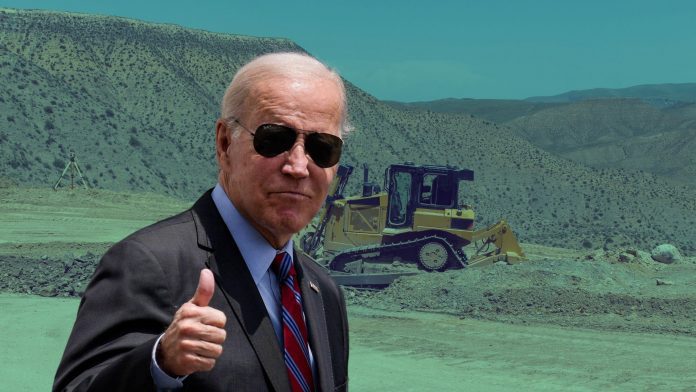The U.S. government has approved the construction of a massive lithium mine in Nevada, aiming to disrupt China’s hold over the global supply of critical minerals needed for electric vehicle (EV) batteries. This Nevada mine, operated by Australian company Ioneer and funded by a $700 million federal loan, is set to become a cornerstone of Ford’s EV supply chain, with enough lithium reserves to power roughly 370,000 EVs annually once operational in 2028.
The project, known as the Rhyolite Ridge mine, marks a significant step for the Biden administration, as it’s the first lithium mine permitted under its climate strategy. With completion projected for 2028, the mine is expected to quadruple the U.S.’s lithium production capacity. In addition to Ford, Toyota and Panasonic have secured future lithium from Rhyolite Ridge to meet demand for their EV batteries. The mine will economically benefit Esmeralda County, Nevada, creating 500 construction jobs and 350 long-term positions in this rural region, about 225 miles north of Las Vegas.
However, the project has faced nearly six years of intense debate between conservationists and Ioneer, primarily due to concerns about the endangered Tiehm’s buckwheat flower, which grows exclusively in this area. Environmental groups, including the Center for Biological Diversity, argue that mining operations will further endanger the species, potentially driving it to extinction. Although the U.S. Bureau of Land Management has stated that the permit includes significant protections for the local ecosystem, environmental groups plan to file lawsuits to halt the project. To address these concerns, Ioneer has reconfigured its plans and committed to environmentally responsible mining techniques, including water recycling.
In 2020, more than 17,000 Tiehm’s buckwheat plants were mysteriously killed, leading to speculation about intentional damage, though Ioneer denied involvement, and federal investigations blamed small mammals. Federal officials maintain that the mine’s impacts on the flower will be minimized thanks to ongoing environmental monitoring and mitigation efforts.
Demand for domestic lithium production has intensified as the U.S. seeks to shift away from imported critical minerals for EV production. The Rhyolite Ridge mine joins a small group of U.S. lithium producers and will be among the largest when completed. As the U.S. Geological Survey recently identified massive lithium reserves in Arkansas that could potentially meet global EV battery demand by 2030, projects like Rhyolite Ridge signal a new era for American lithium extraction and a bold step toward establishing a secure, domestic supply chain.



